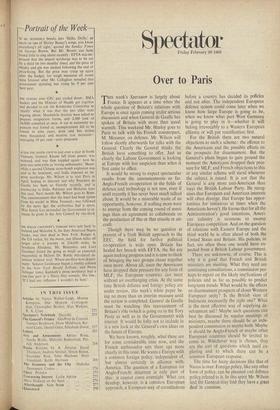Over to Paris
THIS week's Spectator is largely about France. It appears at a time when the whole question of Britain's relations with Europe is once again coming under serious discussion and when General de Gaulle has spoken of Britain with more than usual warmth. This weekend Mr. Healey goes to Paris to talk with his French counterpart, M. Messmer, on defence. Mr. Wilson will follow shortly afterwards for talks with the General. Clearly the General thinks the British have something to offer. Just as clearly the Labour Government is looking at Europe with less suspicion than when it first came to office.
It would be wrong to expect spectacular results from the announcements so far. Anglo-French co-operation in the fields of defence,and technology is not new, even if until recently it has never been much talked about. It would be a miserable waste of an opportunity, however, if nothing more were to emerge from the coming round of meet- ings than an agreement to collaborate on the production of this or that missile or air- craft.
Though there may be no question at present of a fresh British approach to the EEC, the field for further political co-operation is wide open. Britain has healed her breach with EFTA, the Six are again making progress and it is time to think of bringing the two groups closer together once more. Above all, since the Americans have dropped their pressure for any form of MLF, the European countries can meet without an overhanging crisis. At the same time British defence and foreign policy are under review, this week's white paper be- ing no more than an interim measure until the review is completed. Genera! de Gaulle must be watching this reassessment of Britain's role (which is going on in the Tory Party as well as in the Government) with interest. It would be folly not to include in it a new look at the General's own ideas on the future of Europe.
We have known, roughly, what these are for some considerable time now, and the French ambassador sets them out more clearly in this issue. He wants a Europe with a common foreign policy, independent of, but almost certainly in alliance with, America. The question of a European (or Anglo-French) deterrent is only part of this : it cannot come overnight. What can develop, however, is a common European approach, a European way of consultations before a country has decided its policies and not after. The independent European defence system could come later when we know how large Europe is going to be, when we know what part West Germany is going to play in it—whether it will belong irrevocably to a Western European alliance or will put reunification first.
For the British there are two natural objections to such a scheme : the offence to the Americans and the possible effects on the prospects for disarmament. But the General's plans began to gain ground the moment the Americans dropped their pres- sure for MLF, and French objections to this or any similar scheme will stand whenever the subject is raised. It is not that the General is any more anti-American than (say) the British Labour Party. He recog- nises that European and American interests will often diverge, that Europe has oppor- tunities for initiatives at times when the Americans haven't. He knows that for all the Administration's good intentions, Ameri- can industry is ravenous to swamp European competition. And on the question of relations with Eastern Europe and the third world he is often ahead of both the United States and Britain. His policies, in fact, are often those one would have ex- pected from a British Labour government.
There are unknowns, of course. This is why it is good that French and British ministers are meeting. What they need are continuing consultations, a commission per- haps to report on the likely imrlications of policies and as far as possible to predict long-term trends. What would be the effects on disarmament prospects of closer Western European unity? Is the British view of Indonesia necessarily the right one? What is the most effective way of supplying de- velopment aid? Maybe such questions can best be discussed by regular meetings of ministers, maybe there should be an inde- pendent commission or maybe both. Maybe it should be Anglo-French or maybe other European countries should be invited to come in. Whichever way is chosen, they are the sort of questions which need ex- ploring and to which there can be a common European response.
The time for hasty decisions like that of Nasau is over. Foreign policy, like any other form of policy, can be planned and defence policy related to it. In this spirit Mr. Wilson and the General may find they have a great deal in common.


































 Previous page
Previous page